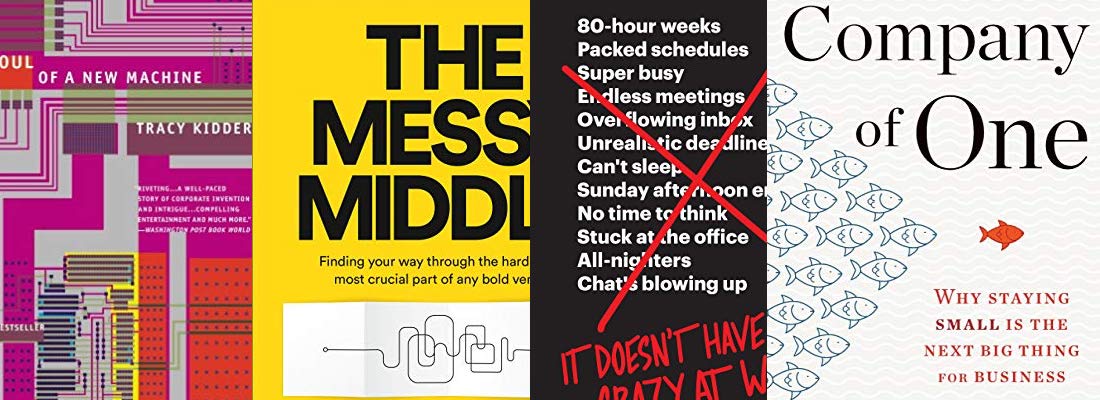
Notes on Soul of a New Machine, Messy Middle, Crazy at Work, Company of One.
Every few years I spend a month or two reading some general business and management books. On average, these are not my favorite books, but they usually have a couple interesting ideas and are eminently skimmable.
Recently, I’ve read through The Soul of A New Machine, The Messy Middle, It Doesn’t Have to Be Crazy at Work, and Company of One. Of these four, The Soul of a New Machine keeps drifting back into my head, and is a book I can imagine recommending and remembering for years. The others, I suspect I won’t remember often, and for me showcase the downsides of the book-as-subscriber-paid-marketing-channel: there usually just isn’t enough to say to fill a book, but the format demands the pages are filled with words, if not with ideas.
Here are my very brief reviews.
The Soul of A New Machine by Tracy Kidder is the story of creating a new computer at Data General in the late 1970s. What’s wild about the book is how familiarly it reads, forty years later. Sometimes when reading a book like The Idea Factory or Dealers of Lightning, it’s easy to believe that folks used to “get it”, and that the state of management has regressed since then, but The Soul of a New Machine is a helpful reminder that questionable management is an ancient invention.
Each person introduced throughout the story reminds me of someone I have worked with, and each situation reminds me of a similar experience I’ve had in my career, particularly the work leading up to the Digg v4 launch.
The book does a particularly good job of showing how folks perceived themselves, and then constrasting that with how others perceived them. It’s a book filled with neither heroes nor villians, but many folks who aspire towards both.
The Messy Middle by Scott Belsky is a book I’ve seen recommended by quite a few folks. The central thesis is that the hardest part of doing things is managing your psychology, remaining engaged over the long-run as you slowly wind your way towards the end. Through the book, it goes through a number of specific examples around hiring, firing, tools, etc and provides some general guidance on approach.
There is a certain category of book that you can probably only truly appreciate of when you’re experiencing something hard yourself, and The Messy Middle exists firmly in that category. I didn’t personally get much out of it, but I could imagine really appreciating it earlier in my career when I was struggling at work with difficult circumstances.
It Doesn’t Have to Be Crazy at Work by Jason Fried and DHH talks through their philosophy for running 37Signals. Similarly to their previous books like Rework, it walks a fine line between content and self-promotion, and sometimes coming across more like the later. There’s nothing wrong with books as a form of self-promotion, I imagine most books are written for that purpose, but I’d love a slightly more subtle tact.
The core message in this book is that growth often comes at the expense of running a business that you and your team enjoy being part of, and that we shouldn’t assume growth is the best choice in all circumstances. In this message, there is an echo back to an era where shareholder growth is balanced against the employee experience, and an explicit aim to refutate the standard technology company playbook.
Parts of this refutation feel authentic, and other parts don’t. It’s not entirely obvious to me that employees are much better off in a world of privately-held companies where only owners participate in profit sharing (although 37Signals is planning to move towards some profit sharing soon, in their company’s twentieth anniversary), but certainly I’ve seen stable small teams do amazing things, and at times I miss the comfortable excellence that comes from working in such a team.
Overall, this isn’t a book I’d recommend, since it’s a bit light on ideas and heavy on self-promotion, but I’m glad I read it as I imagine it’ll be referenced a fair amount.
Company of One by Paul Jarvis is advocates for living better by refusing the clarion call of growth. This is roughly the book you’d get if you poured the The Start-up of You, Lean Startup and Your Money or Your Life into a mixer and blended for a few minutes. Its message has a lot in common with It Doesn’t Have to Be Crazy at Work, but this book does a better job of prioritizing a cohesive message over self-promotion.
I believe the premise of this book was expanded out of a single blog post, and personally there just weren’t quite enough ideas to flesh out an entire book. I enjoyed reading it, the message certainly resonates, but I don’t think I’ll return to it.